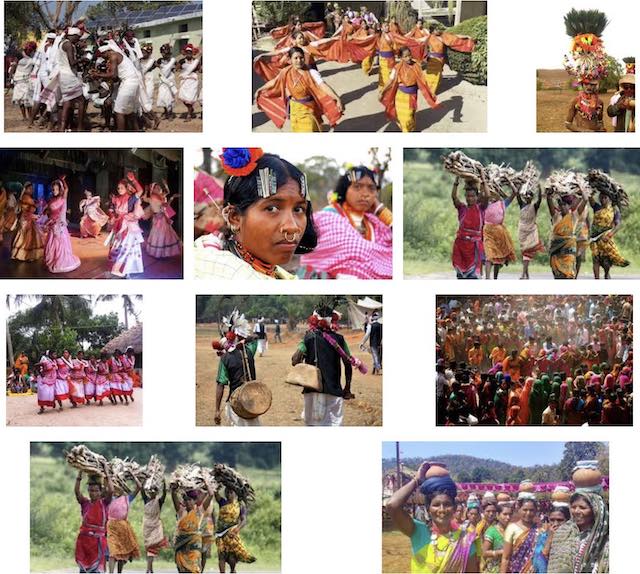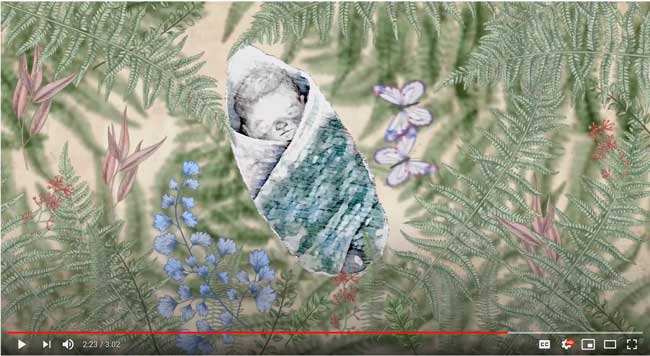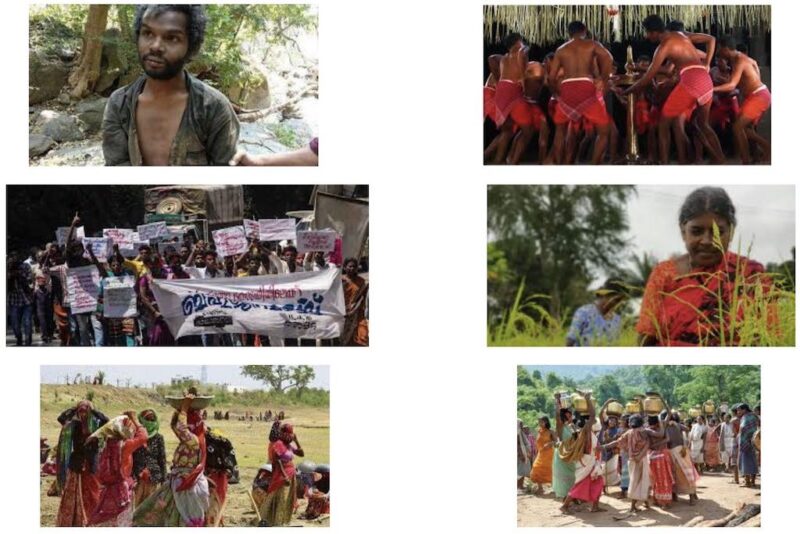‘Kanavu’ means ‘dream‘. It is exactly a dream, an initiative of the alternative educational vision of K. J. Baby and his like-minded friends. The inception of the idea can be traced back to Maveli Manatram (1991), Baby‘s novel that was honoured on many stages including the Kerala Sahithya Academi Award of 1994. ‘Mantram’ is ‘tribe‘; this novel elaborates the myth of ‘mavelikkaalam’, an ideal time period devoid of any exploitation and injustice. It depicts the harsh realities faced by the Adiyor [Adiya] tribe and narrates the story of a couple who escapes land lords to pursue the dream of an ideal habitat. […]
[Tribal] children are preferred for particular works due to the benefit of vigorous toil for low wages. […]
Income generation at a very young age reduces the scope for development of other individual resources. […]
In the advancing line of educational thoughts, Kanavu has a position alongside the modern perceptions. Never aligned with any particular ideology or pedagogy, Kanavu stands on its own experiments on learning. It can be read as a chapter of globally evolving educational thoughts that critically analyse the propagandist notions of education. Kanavu is significant where the perception prevails that there is no choice. It was not a bundle of theories or plans, but a group of practical efforts. Such efforts can add to the global development if aided by constitutional provisions and societal support.
Source: “A Case Study of ‘Kanavu’ in the Evolutionary Perspective of Approaches to Education” by Ameya MR (MA thesis, Mahatma Gandhi University 2015), pp. 55-57 & 79
URL: https://www.academia.edu/21289981
Date visited: 9 April 2021
Dreams do not always come true. But this one is an exception. Nestled in the lush green Cheengode hills in Wayanad district, Kanavu (meaning dream) is a school for the local tribal children. Set up by writer and activist Kochupoovathinkal Joseph Baby, 54, with wife Shirley, 50, the school helps the tribals capture the essence of their own tradition. […]
Here the tribal children learn traditional songs, dance, drawing, cooking and their arts and crafts, besides reading, writing and even computers and filmmaking. Ayurveda and Kalarippayattu (martial arts) are also part of the curriculum. The cultural programmes presented by Kanavu students is another high point of the school and are hugely popular in Kerala. […]
Some of its former students are now working with a Gandhian voluntary organisation as handloom workers. “They all send a share of the money they make to sponsor one or two children. The alumni also take turns to return to work in Kanavu for three years,” says Chipran, a student and an artist.
Source: Future in the making : Cover Story: India Today July 16, 2009
Address : http://indiatoday.intoday.in/site/story/Future+in+the+making/0/52129.html
Date Visited: Sun Jul 10 2011 01:19:11 GMT+0200 (CEST)
thirdeyefilms 2001 (34:12)
- View the documentary video here
- Film`Guda’ ready for screening
- Wayanad song by Kanavu music group founded by JK Baby
Kanavu – Where LearningHappens
An Ethnographic Account of a Learning Space
By Alex M George, Economic and Political Weekly, July 2, 2005A discussion of the ethnography of an alternative school/commune, Kanavu in Wayanadu district of Kerala. It explores the diverse learning spaces and methodologies that have been incorporated intoits system, where learning happens for children who participate. Read more >>
Source: Kanavu – where learning happens | Alex M George – Academia.edu
Address : https://www.academia.edu/263945/Kanavu_-_where_learning_happens
Date Visited: Tue Feb 05 2013 17:42:02 GMT+0100 (CET)
Success stories that have made a world of difference for millions of schoolchildren:
Jointly creating storybooks in familiar languages for first-generation learners: Suchana, Pratham Books and StoryWeaver | More success stories >>
Search tips: More about Kanavu and Wayanad’s tribal cultural heritage | Use the search field seen below to find up-to-date information on the region’s Adivasi films, arts and related subjects
Up-to-date reports by Indian experts and journalists
Search tips
Combine the name of any particular state, language or region with that of any tribal (Adivasi) community.
Add keywords of special interest (music, poetry, dance just as health, sacred grove and biodiversity); learn about the rights of Scheduled Tribes such as the “Forest Rights Act” (FRA); and the United Nations “Declaration on the Rights of Indigenous Peoples”, “Universal Declaration of Human Rights”, “women’s rights”, or “children’s right to education”.
Ask a question that includes “tribal” or “Adivasi”, for instance: “Adivasi way of life better?” (or “tribal way of life worse?”)
Specify any particular issue or news item (biodiversity, bonded labour and human trafficking, climate change, ecology, economic development, ethnobotany, ethnomedicine, global warming, hunter-gatherers in a particular region or state, prevention of rural poverty, water access).
For official figures include “scheduled tribe ST” along with a union state or region: e.g. “Chhattisgarh ST community”, “Himalayan tribe”, “Scheduled tribe Tamil Nadu census”, “ST Kerala census”, “Particularly Vulnerable Tribal Group Jharkhand”, “PVTG Rajasthan”, “Adivasi ST Kerala”, “Adibasi ST West Bengal” etc.
In case the Google Custom Search window is not displayed here try the following: (1) toggle between “Reader” and regular viewing; (2) in your browser’s Security settings select “Enable JavaScript” | More tips >>
Note: hyperlinks and quotes are meant for fact-checking and information purposes only | Disclaimer >>
List of websites covered by this Google custom search engine
Academia.edu (platform for academics to share research papers) – www.academia.edu
Archive.org – https://archive.org
Centre for Science and Environment – https://www.cseindia.org
Current Conservation – https://www.currentconservation.org
Development and Cooperation (D+C) https://www.dandc.eu
Down To Earth (India) – www.downtoearth.org.in
India Environment Portal – www.indiaenvironmentportal.org.in
Harnessing Nature Magazine – https://harnessingnature.online
Mongabay-India – https://india.mongabay.com
M S Swaminathan Research Foundation – www.mssrf.org
Navdanya (protecting India’s biodiversity based food heritage) – https://navdanya.org
Third World Network (Penang, Malaysia) – https://twn.my
The Shola Trust (nature conservation in the Nilgiri region) – www.thesholatrust.org

Indian online periodicals and platforms | Images view >>
~ ~ ~
Personalize your CustomSearch by combining other search words >>
(e.g. name of a tribal community and region, a craft, or dance and puppetry)
Research the above issues with the help of Shodhganga: A reservoir of theses from universities all over India, made available under Open Access >>
Note: hyperlinks and quotes are meant for fact-checking and information purposes only | Disclaimer >>
“The smart boy or clever girl who is deprived of the opportunity of schooling, or who goes to a school with dismal facilities (not to mention the high incidence of absentee teachers), not only loses the opportunities he or she could have had, but also adds to the massive waste of talent that is a characteristic of the life of our country.” – Nobel Awardee Amartya Sen in The Argumentative Indian (Penguin Books, 2005), p. 344 | Find this and other books published in India >>
Related: Tribal Children’s Right to Education | Childhood | Ekalavya (Eklavya, Eklabya), EMR & Factory schools | Childrens rights: UNICEF India >>

Watch “The Good Ancestor – The Legacies We Leave” (3 min.): An animation that explores the legacies we might leave for future generations >>
Links to some of the most important organisations, thinkers and doers that are leading the way and that have inspired the book The Good Ancestor by Roman Krznaric >>
See also
Biodiversity and development – Kerala
Childhood – Kerala | Childrens rights: UNICEF India | Safe search
Childrens rights: English or Malayalam (UNICEF India)
eBook | Background guide for education
Education and literacy | Right to education
Kerala | State wise ST list (Scheduled Tribes)
Recommendations by the Expert Committee on Tribal Health
Tribal schools and educational projects – Kerala
Video | M.S. Swaminathan on Biodiversity and the sharing of resources
Video | Trailer to “Have you seen the arana?” – Kerala
Vulnerable tribal groups – Kerala
Women | Safe search | President Droupadi Murmu on women’s empowerment

View Tribal Cultural Heritage in India Foundation in a larger map